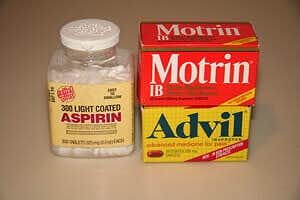
Once upon a time doctors actually prescribed aspirin for headaches, backaches, osteoarthritis, rheumatoid arthritis and other painful conditions. But once non steroidal anti-inflammatory drugs (NSAIDs) hit the market, aspirin became a step child. Instead of recommending aspirin against pain, physicians prescribed drugs like Clinoril (sulindac), Feldene (piroxicam), Motrin (ibuprofen), Naprosyn (naproxen), Voltaren (diclofenac), Mobic (meloxicam) or Celebrex (celecoxib).
The Seduction of the name “Nonsteroidal”
During the 1950s physician prescribed a LOT of steroids. Drugs like cortisone and prednisone became incredibly popular. That’s because they made doctors seem like magicians. A patient suffering from the debilitating symptoms of rheumatoid arthritis could get dramatic relief from corticosteroids. Only later did we learn that such relief came at a steep price: hypertension, weight gain, osteoporosis, muscle weakness, diabetes, cataracts, glaucoma and much more. That’s why the idea of “non steroidal” pain relief was so appealing.
Not only did doctors embrace NSAIDs, they began to shun aspirin against pain relief. They presumed that aspirin was more dangerous than the newer NSAIDs. Aspirin definitely caused stomach ulcers. The fact that other prescribed NSAIDs did too didn’t seem as scary. There was also the perception that drugs like ibuprofen or naproxen were more effective than aspirin against pain. What doctors didn’t realize then was that NSAIDs were hard on the heart and vascular system.
Read more about that “little” complication at these links:
Is There a Link Between NSAIDs like Ibuprofen and Heart Attack?
Really Bad News About Ibuprofen, Naproxen and Other NSAIDs
Readers Wonders About Aspirin Against Pain:
Q. Since all NSAIDs except aspirin increase the risk of heart attacks and many other problems, why isn’t aspirin used more often for pain?
A. There is a perception that aspirin is less effective than NSAIDs like ibuprofen or naproxen, though there’s no convincing evidence that such NSAIDs are superior for pain relief. Many health professionals also worry that aspirin is more irritating to the digestive tract. All NSAIDs, including aspirin, can cause irritation and ulcers.
As you note, aspirin does not increase the risk for heart attacks the way other NSAIDs do. Anyone who takes aspirin for more than a few days should consult a physician for advice and monitoring, though. The doctor will be on the lookout for signs of digestive damage.
Other Readers on Aspirin Against Pain:
Carolyn in Florida offers:
“I started taking ENTERIC coated aspirin and take it with food.
It helps the arthritis in my thumbs better than any of the NSAIDs.“I am following the anti inflammatory food plan. The aspirin is effective when I take it once or twice a day.”
Vali in Amsterdam says his doctor still prescribes aspirin:
“My doctor told me that aspirin is safe. It is advisable to take an antacid prior to your aspirin just to protect your stomach, unless you use a buffered aspirin.”
We would disagree with Vali’s doctor in that some people develop ulcers even if they take aspirin with an antacid. Buffered aspirin may not always protect the stomach from irritation or lesions.
Marilyn in Alabama says:
“Aspirin has been my savior for over 40 years. My stomach tolerates it well, making me reluctant to venture in the land of other NSAIDs.”
Robert in San Diego offers:
“I consider aspirin as my first and most preferred choice for muscle and joint related pain. Aspirin has true therapeutic properties not associated with any other pain reliever. I find that it seems to help resolve the source of the pain rather than just mask the pain. Taking a regular regimen of regular strength, enteric coated aspirin for several days really makes a huge difference!
“Is it as convenient as once or twice-a-day drugs? No, but the results, for me, are well worth the inconvenience. I wish to credit a physiatrist at Ohio State University Hospital for informing me of the benefits of aspirin 30+ years ago!”
Final Word on Aspirin Against Pain:
No one should ever take aspirin regularly without medical supervision. It is an NSAID. That means it can be just as irritating to the digestive tract as ibuprofen or naproxen. The good news, though, is that it is unlikely to increase the risk of a blood clot or heart attack.
Share your own aspirin story (positive or negative) below in the comment section.

